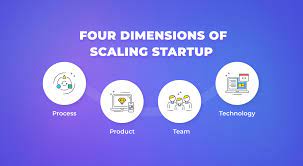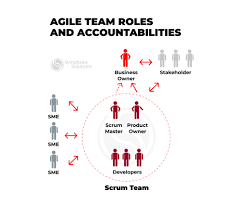Software Development for Startups: Why It Matters and How to Do It Right
For startups, software development is often a crucial part of their success. Whether it’s developing a mobile app, creating a website, or building custom software to support business operations, startups need reliable and effective software solutions to compete in today’s digital landscape.
However, software development can be a complex and challenging process, especially for startups that are just starting out. Here are some key considerations for startups looking to embark on the software development journey:
Define Your Goals and Requirements
Before you start any software development project, it’s important to define your goals and requirements. What do you want the software to achieve? What features does it need? Who will be using it? By answering these questions upfront, you can ensure that your software development project stays on track and meets your business needs.
Choose the Right Development Methodology
There are many different methodologies for software development, such as Agile, Waterfall, and DevOps. Each has its own strengths and weaknesses, so it’s important to choose the right one for your startup’s specific needs. For example, Agile is often favored by startups because it allows for more flexibility and faster iterations.
Work with Experienced Developers
Software development is not something that should be taken lightly – it requires expertise and experience to get right. For startups with limited resources or technical expertise in-house, working with an experienced software development partner can help ensure that the project is completed on time and within budget.
Prioritize Security
In today’s digital landscape, security should be a top priority for any startup developing software solutions. This means implementing secure coding practices from the outset of the project, conducting regular security audits throughout the development process, and ensuring that all data is stored securely.
Test Early and Often
Testing is an essential part of any software development project – it helps identify bugs and issues early on, before they become more costly to fix. Startups should prioritize testing throughout the development process, using automated testing tools and manual testing as needed.
In conclusion, software development is a critical component of success for startups in today’s digital landscape. By following these key considerations – defining goals and requirements, choosing the right methodology, working with experienced developers, prioritizing security, and testing early and often – startups can ensure that their software development projects are a success.
Answers to Top 4 Software Development Questions for Startups
- What software do I need as a startup?
- What is startups software?
- What are 4 key types of startups?
- How to develop software for startup?
What software do I need as a startup?
The software you need as a startup will depend on your specific business needs and goals. However, there are some essential software solutions that most startups will require:
Productivity Software
Productivity software, such as Microsoft Office or Google Workspace, is essential for most startups. These tools include word processing, spreadsheet, and presentation software that can help you manage your business operations and communicate with your team.
Accounting Software
Accounting software is crucial for managing your finances as a startup. Solutions like QuickBooks or Xero can help you track expenses, create invoices, manage payroll, and generate financial reports.
Project Management Software
Project management software can help you keep track of tasks, deadlines, and team members. Tools like Asana or Trello can help you stay organized and collaborate effectively with your team.
Sales and Marketing Software
Sales and marketing software can help startups grow their customer base. Solutions like HubSpot or Salesforce can help you manage customer relationships, automate marketing campaigns, and track sales leads.
Communication Software
Communication is key for any startup. Tools like Slack or Zoom can help you communicate effectively with your team members even if they are working remotely.
Of course, these are just some of the essential software solutions that most startups will need. Depending on your industry and specific business needs, there may be other types of software that are essential for your success. It’s important to carefully evaluate your needs and goals before investing in any type of software solution.
What is startups software?
“Startups software” is a term that refers to software solutions developed specifically for startups. These solutions are designed to help startups manage their operations, improve their productivity, and grow their businesses more effectively.
Examples of startups software include customer relationship management (CRM) tools, project management software, accounting software, and marketing automation platforms. These tools are often cloud-based and accessible from anywhere with an internet connection, making them ideal for startups that may not have a physical office or need to work remotely.
Startups software can also include custom software solutions developed specifically for a startup’s unique needs. For example, a startup in the healthcare industry might need custom software to manage patient data securely and efficiently.
Overall, startups software is designed to help startups overcome some of the common challenges they face in their early stages of growth. By streamlining processes and providing valuable insights into business operations, startups can use these tools to improve their chances of success in today’s competitive business landscape.
What are 4 key types of startups?
There are many ways to categorize startups, but here are four key types:
- Lifestyle Startups: These startups are often founded by individuals or small teams who want to create a business that supports their lifestyle goals. They may not have plans for rapid growth or scaling, but instead focus on creating a sustainable business that provides them with the income and flexibility they desire.
- Scalable Startups: These startups are focused on rapid growth and scaling through innovative products or services that can be replicated quickly and efficiently. They often require significant investment capital to fund their growth and expansion plans.
- Social Impact Startups: These startups are focused on creating positive social or environmental impact through their products or services. They may have a mission-driven approach that prioritizes social good over profits, but still need to generate revenue to sustain their operations.
- Technology Startups: These startups are focused on developing new technologies or software solutions that can disrupt existing markets or create entirely new ones. They often require specialized technical expertise and significant investment capital to develop and bring their products to market.
Of course, these categories aren’t mutually exclusive – many startups could fit into more than one category depending on their goals, mission, and focus.
How to develop software for startup?
Developing software for a startup can be a complex and challenging process. Here are the key steps to follow when developing software for a startup:
Define Your Goals and Requirements
Before starting any software development project, it’s important to define your goals and requirements. What do you want the software to achieve? What features does it need? Who will be using it? By answering these questions upfront, you can ensure that your software development project stays on track and meets your business needs.
Choose the Right Development Methodology
There are many different methodologies for software development, such as Agile, Waterfall, and DevOps. Each has its own strengths and weaknesses, so it’s important to choose the right one for your startup’s specific needs. For example, Agile is often favored by startups because it allows for more flexibility and faster iterations.
Work with Experienced Developers
Software development is not something that should be taken lightly – it requires expertise and experience to get right. For startups with limited resources or technical expertise in-house, working with an experienced software development partner can help ensure that the project is completed on time and within budget.
Prioritize Security
In today’s digital landscape, security should be a top priority for any startup developing software solutions. This means implementing secure coding practices from the outset of the project, conducting regular security audits throughout the development process, and ensuring that all data is stored securely.
Test Early and Often
Testing is an essential part of any software development project – it helps identify bugs and issues early on before they become more costly to fix. Startups should prioritize testing throughout the development process using automated testing tools and manual testing as needed.
Plan for Scalability
As your startup grows, your software needs may change. It’s important to plan for scalability from the outset of the project so that your software can grow and adapt with your business.
Continuously Improve and Iterate
Software development is an ongoing process – even after the initial release, there will always be room for improvement. Startups should plan to continuously improve and iterate their software based on user feedback and changing business needs.
In conclusion, developing software for a startup requires careful planning, execution, and ongoing improvement. By following these key steps – defining goals and requirements, choosing the right methodology, working with experienced developers, prioritizing security, testing early and often, planning for scalability, and continuously improving – startups can ensure that their software development projects are a success.




